Business Finance Report: Management vs. Financial Accounting
VerifiedAdded on 2023/01/12
|8
|1460
|81
Report
AI Summary
This report provides a comprehensive overview of the distinctions between management and financial accounting. It explores the differing aims, regulatory requirements, perspectives, and nature of information in each field. The report highlights the users of financial information, including internal users like top-level managers and owners, and external users such as investors, lenders, suppliers, customers, tax authorities, and government entities. It details how each user group utilizes accounting information for decision-making and assessing financial performance. The report also covers the governing principles, time horizons, reporting beneficiaries, output, relevance of data, independent audits, and confidentiality aspects of both management and financial accounting, ultimately emphasizing their importance in maintaining a successful business. It concludes by underscoring the significance of both accounting frameworks for effective business management.

Business Finance
Paraphrase This Document
Need a fresh take? Get an instant paraphrase of this document with our AI Paraphraser
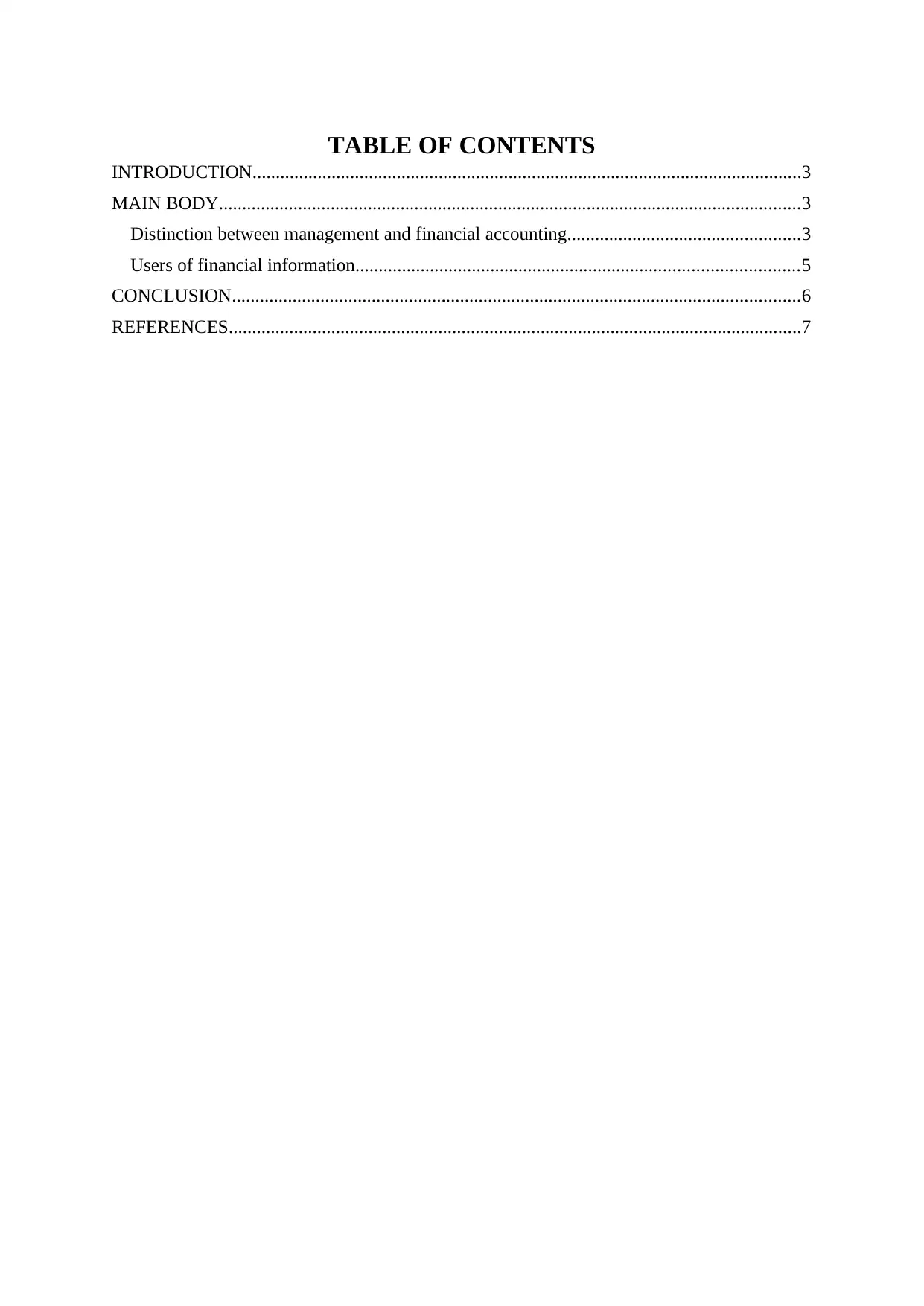
TABLE OF CONTENTS
INTRODUCTION......................................................................................................................3
MAIN BODY.............................................................................................................................3
Distinction between management and financial accounting..................................................3
Users of financial information...............................................................................................5
CONCLUSION..........................................................................................................................6
REFERENCES...........................................................................................................................7
INTRODUCTION......................................................................................................................3
MAIN BODY.............................................................................................................................3
Distinction between management and financial accounting..................................................3
Users of financial information...............................................................................................5
CONCLUSION..........................................................................................................................6
REFERENCES...........................................................................................................................7
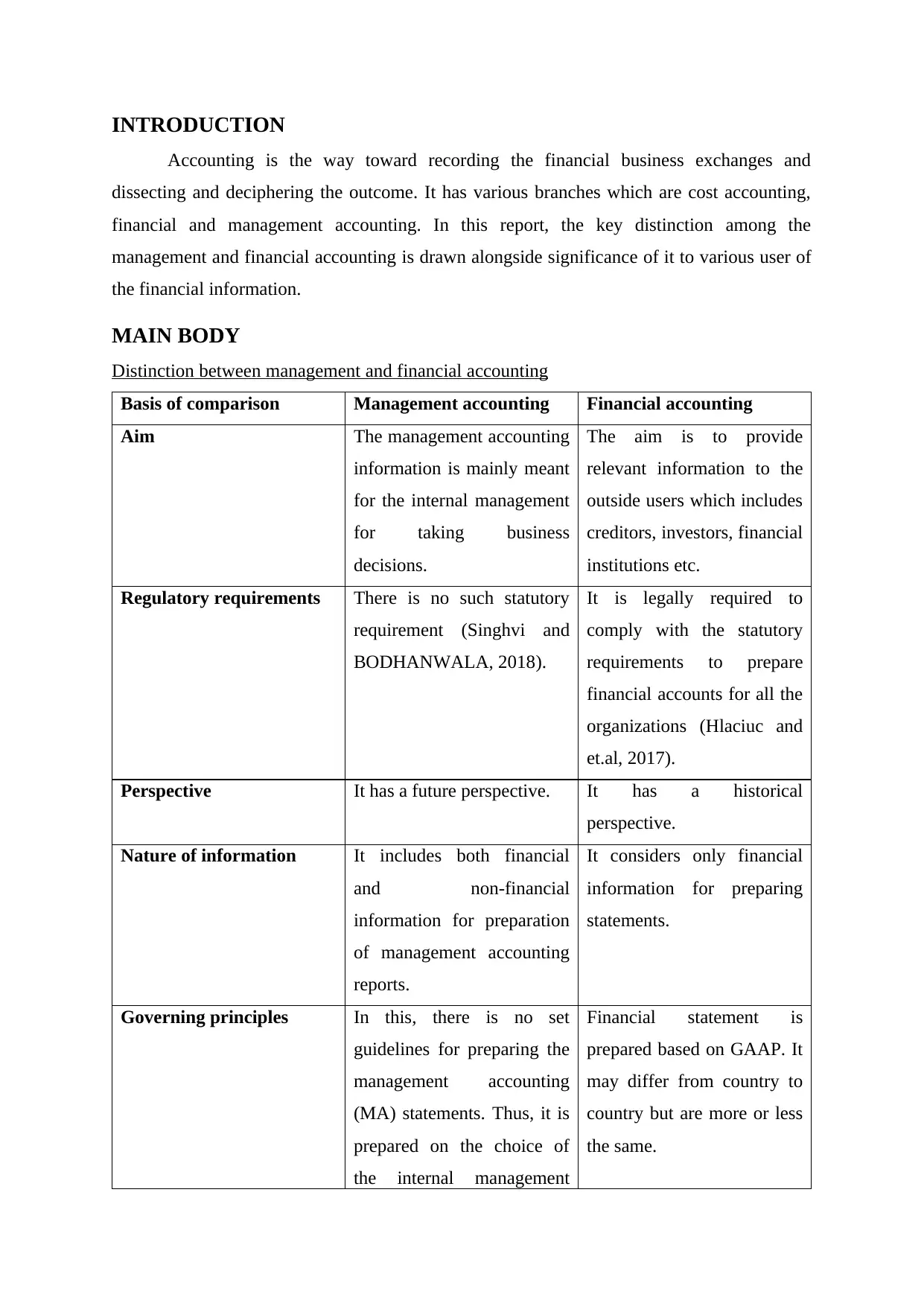
INTRODUCTION
Accounting is the way toward recording the financial business exchanges and
dissecting and deciphering the outcome. It has various branches which are cost accounting,
financial and management accounting. In this report, the key distinction among the
management and financial accounting is drawn alongside significance of it to various user of
the financial information.
MAIN BODY
Distinction between management and financial accounting
Basis of comparison Management accounting Financial accounting
Aim The management accounting
information is mainly meant
for the internal management
for taking business
decisions.
The aim is to provide
relevant information to the
outside users which includes
creditors, investors, financial
institutions etc.
Regulatory requirements There is no such statutory
requirement (Singhvi and
BODHANWALA, 2018).
It is legally required to
comply with the statutory
requirements to prepare
financial accounts for all the
organizations (Hlaciuc and
et.al, 2017).
Perspective It has a future perspective. It has a historical
perspective.
Nature of information It includes both financial
and non-financial
information for preparation
of management accounting
reports.
It considers only financial
information for preparing
statements.
Governing principles In this, there is no set
guidelines for preparing the
management accounting
(MA) statements. Thus, it is
prepared on the choice of
the internal management
Financial statement is
prepared based on GAAP. It
may differ from country to
country but are more or less
the same.
Accounting is the way toward recording the financial business exchanges and
dissecting and deciphering the outcome. It has various branches which are cost accounting,
financial and management accounting. In this report, the key distinction among the
management and financial accounting is drawn alongside significance of it to various user of
the financial information.
MAIN BODY
Distinction between management and financial accounting
Basis of comparison Management accounting Financial accounting
Aim The management accounting
information is mainly meant
for the internal management
for taking business
decisions.
The aim is to provide
relevant information to the
outside users which includes
creditors, investors, financial
institutions etc.
Regulatory requirements There is no such statutory
requirement (Singhvi and
BODHANWALA, 2018).
It is legally required to
comply with the statutory
requirements to prepare
financial accounts for all the
organizations (Hlaciuc and
et.al, 2017).
Perspective It has a future perspective. It has a historical
perspective.
Nature of information It includes both financial
and non-financial
information for preparation
of management accounting
reports.
It considers only financial
information for preparing
statements.
Governing principles In this, there is no set
guidelines for preparing the
management accounting
(MA) statements. Thus, it is
prepared on the choice of
the internal management
Financial statement is
prepared based on GAAP. It
may differ from country to
country but are more or less
the same.
⊘ This is a preview!⊘
Do you want full access?
Subscribe today to unlock all pages.

Trusted by 1+ million students worldwide
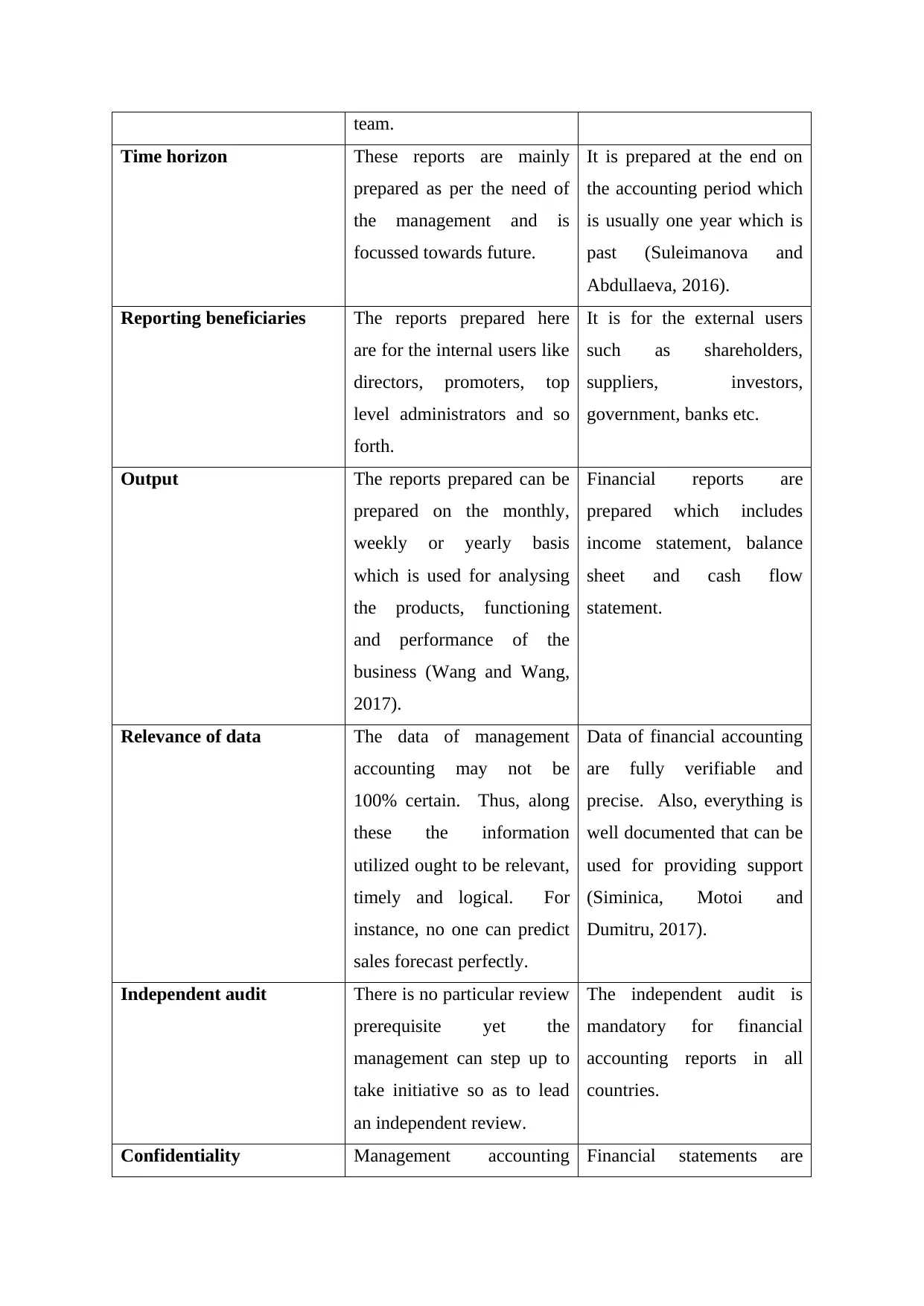
team.
Time horizon These reports are mainly
prepared as per the need of
the management and is
focussed towards future.
It is prepared at the end on
the accounting period which
is usually one year which is
past (Suleimanova and
Abdullaeva, 2016).
Reporting beneficiaries The reports prepared here
are for the internal users like
directors, promoters, top
level administrators and so
forth.
It is for the external users
such as shareholders,
suppliers, investors,
government, banks etc.
Output The reports prepared can be
prepared on the monthly,
weekly or yearly basis
which is used for analysing
the products, functioning
and performance of the
business (Wang and Wang,
2017).
Financial reports are
prepared which includes
income statement, balance
sheet and cash flow
statement.
Relevance of data The data of management
accounting may not be
100% certain. Thus, along
these the information
utilized ought to be relevant,
timely and logical. For
instance, no one can predict
sales forecast perfectly.
Data of financial accounting
are fully verifiable and
precise. Also, everything is
well documented that can be
used for providing support
(Siminica, Motoi and
Dumitru, 2017).
Independent audit There is no particular review
prerequisite yet the
management can step up to
take initiative so as to lead
an independent review.
The independent audit is
mandatory for financial
accounting reports in all
countries.
Confidentiality Management accounting Financial statements are
Time horizon These reports are mainly
prepared as per the need of
the management and is
focussed towards future.
It is prepared at the end on
the accounting period which
is usually one year which is
past (Suleimanova and
Abdullaeva, 2016).
Reporting beneficiaries The reports prepared here
are for the internal users like
directors, promoters, top
level administrators and so
forth.
It is for the external users
such as shareholders,
suppliers, investors,
government, banks etc.
Output The reports prepared can be
prepared on the monthly,
weekly or yearly basis
which is used for analysing
the products, functioning
and performance of the
business (Wang and Wang,
2017).
Financial reports are
prepared which includes
income statement, balance
sheet and cash flow
statement.
Relevance of data The data of management
accounting may not be
100% certain. Thus, along
these the information
utilized ought to be relevant,
timely and logical. For
instance, no one can predict
sales forecast perfectly.
Data of financial accounting
are fully verifiable and
precise. Also, everything is
well documented that can be
used for providing support
(Siminica, Motoi and
Dumitru, 2017).
Independent audit There is no particular review
prerequisite yet the
management can step up to
take initiative so as to lead
an independent review.
The independent audit is
mandatory for financial
accounting reports in all
countries.
Confidentiality Management accounting Financial statements are
Paraphrase This Document
Need a fresh take? Get an instant paraphrase of this document with our AI Paraphraser
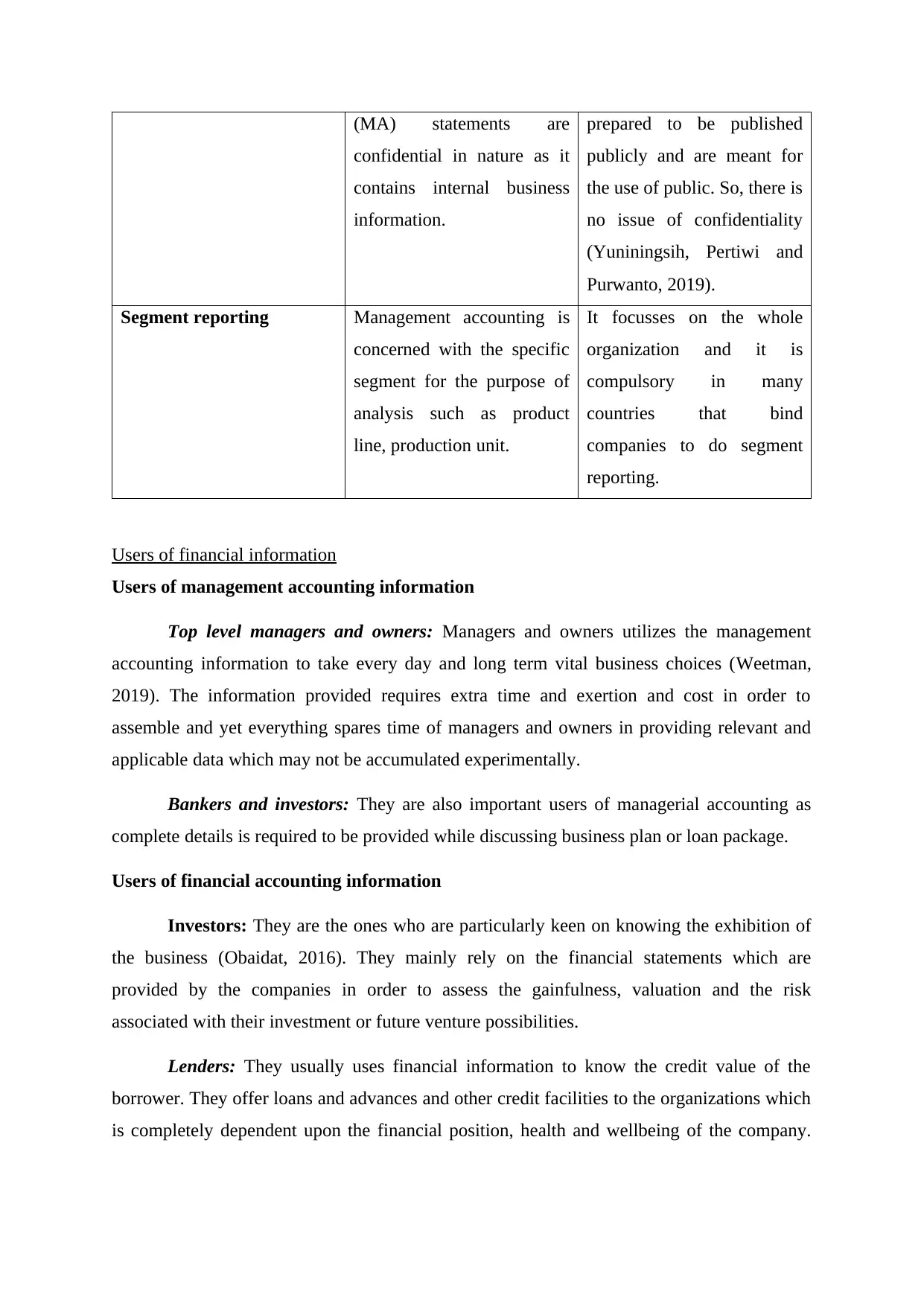
(MA) statements are
confidential in nature as it
contains internal business
information.
prepared to be published
publicly and are meant for
the use of public. So, there is
no issue of confidentiality
(Yuniningsih, Pertiwi and
Purwanto, 2019).
Segment reporting Management accounting is
concerned with the specific
segment for the purpose of
analysis such as product
line, production unit.
It focusses on the whole
organization and it is
compulsory in many
countries that bind
companies to do segment
reporting.
Users of financial information
Users of management accounting information
Top level managers and owners: Managers and owners utilizes the management
accounting information to take every day and long term vital business choices (Weetman,
2019). The information provided requires extra time and exertion and cost in order to
assemble and yet everything spares time of managers and owners in providing relevant and
applicable data which may not be accumulated experimentally.
Bankers and investors: They are also important users of managerial accounting as
complete details is required to be provided while discussing business plan or loan package.
Users of financial accounting information
Investors: They are the ones who are particularly keen on knowing the exhibition of
the business (Obaidat, 2016). They mainly rely on the financial statements which are
provided by the companies in order to assess the gainfulness, valuation and the risk
associated with their investment or future venture possibilities.
Lenders: They usually uses financial information to know the credit value of the
borrower. They offer loans and advances and other credit facilities to the organizations which
is completely dependent upon the financial position, health and wellbeing of the company.
confidential in nature as it
contains internal business
information.
prepared to be published
publicly and are meant for
the use of public. So, there is
no issue of confidentiality
(Yuniningsih, Pertiwi and
Purwanto, 2019).
Segment reporting Management accounting is
concerned with the specific
segment for the purpose of
analysis such as product
line, production unit.
It focusses on the whole
organization and it is
compulsory in many
countries that bind
companies to do segment
reporting.
Users of financial information
Users of management accounting information
Top level managers and owners: Managers and owners utilizes the management
accounting information to take every day and long term vital business choices (Weetman,
2019). The information provided requires extra time and exertion and cost in order to
assemble and yet everything spares time of managers and owners in providing relevant and
applicable data which may not be accumulated experimentally.
Bankers and investors: They are also important users of managerial accounting as
complete details is required to be provided while discussing business plan or loan package.
Users of financial accounting information
Investors: They are the ones who are particularly keen on knowing the exhibition of
the business (Obaidat, 2016). They mainly rely on the financial statements which are
provided by the companies in order to assess the gainfulness, valuation and the risk
associated with their investment or future venture possibilities.
Lenders: They usually uses financial information to know the credit value of the
borrower. They offer loans and advances and other credit facilities to the organizations which
is completely dependent upon the financial position, health and wellbeing of the company.
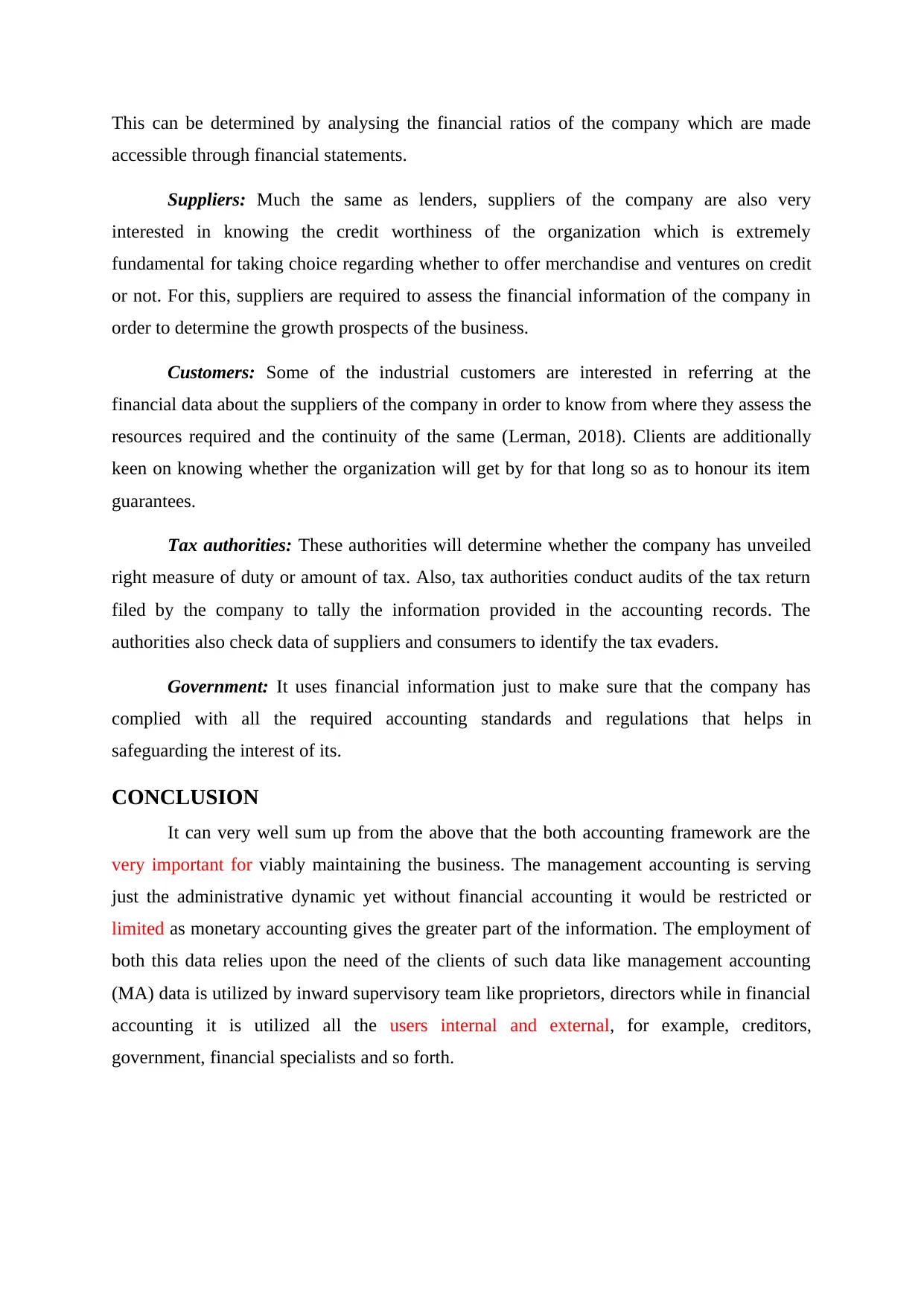
This can be determined by analysing the financial ratios of the company which are made
accessible through financial statements.
Suppliers: Much the same as lenders, suppliers of the company are also very
interested in knowing the credit worthiness of the organization which is extremely
fundamental for taking choice regarding whether to offer merchandise and ventures on credit
or not. For this, suppliers are required to assess the financial information of the company in
order to determine the growth prospects of the business.
Customers: Some of the industrial customers are interested in referring at the
financial data about the suppliers of the company in order to know from where they assess the
resources required and the continuity of the same (Lerman, 2018). Clients are additionally
keen on knowing whether the organization will get by for that long so as to honour its item
guarantees.
Tax authorities: These authorities will determine whether the company has unveiled
right measure of duty or amount of tax. Also, tax authorities conduct audits of the tax return
filed by the company to tally the information provided in the accounting records. The
authorities also check data of suppliers and consumers to identify the tax evaders.
Government: It uses financial information just to make sure that the company has
complied with all the required accounting standards and regulations that helps in
safeguarding the interest of its.
CONCLUSION
It can very well sum up from the above that the both accounting framework are the
very important for viably maintaining the business. The management accounting is serving
just the administrative dynamic yet without financial accounting it would be restricted or
limited as monetary accounting gives the greater part of the information. The employment of
both this data relies upon the need of the clients of such data like management accounting
(MA) data is utilized by inward supervisory team like proprietors, directors while in financial
accounting it is utilized all the users internal and external, for example, creditors,
government, financial specialists and so forth.
accessible through financial statements.
Suppliers: Much the same as lenders, suppliers of the company are also very
interested in knowing the credit worthiness of the organization which is extremely
fundamental for taking choice regarding whether to offer merchandise and ventures on credit
or not. For this, suppliers are required to assess the financial information of the company in
order to determine the growth prospects of the business.
Customers: Some of the industrial customers are interested in referring at the
financial data about the suppliers of the company in order to know from where they assess the
resources required and the continuity of the same (Lerman, 2018). Clients are additionally
keen on knowing whether the organization will get by for that long so as to honour its item
guarantees.
Tax authorities: These authorities will determine whether the company has unveiled
right measure of duty or amount of tax. Also, tax authorities conduct audits of the tax return
filed by the company to tally the information provided in the accounting records. The
authorities also check data of suppliers and consumers to identify the tax evaders.
Government: It uses financial information just to make sure that the company has
complied with all the required accounting standards and regulations that helps in
safeguarding the interest of its.
CONCLUSION
It can very well sum up from the above that the both accounting framework are the
very important for viably maintaining the business. The management accounting is serving
just the administrative dynamic yet without financial accounting it would be restricted or
limited as monetary accounting gives the greater part of the information. The employment of
both this data relies upon the need of the clients of such data like management accounting
(MA) data is utilized by inward supervisory team like proprietors, directors while in financial
accounting it is utilized all the users internal and external, for example, creditors,
government, financial specialists and so forth.
⊘ This is a preview!⊘
Do you want full access?
Subscribe today to unlock all pages.

Trusted by 1+ million students worldwide
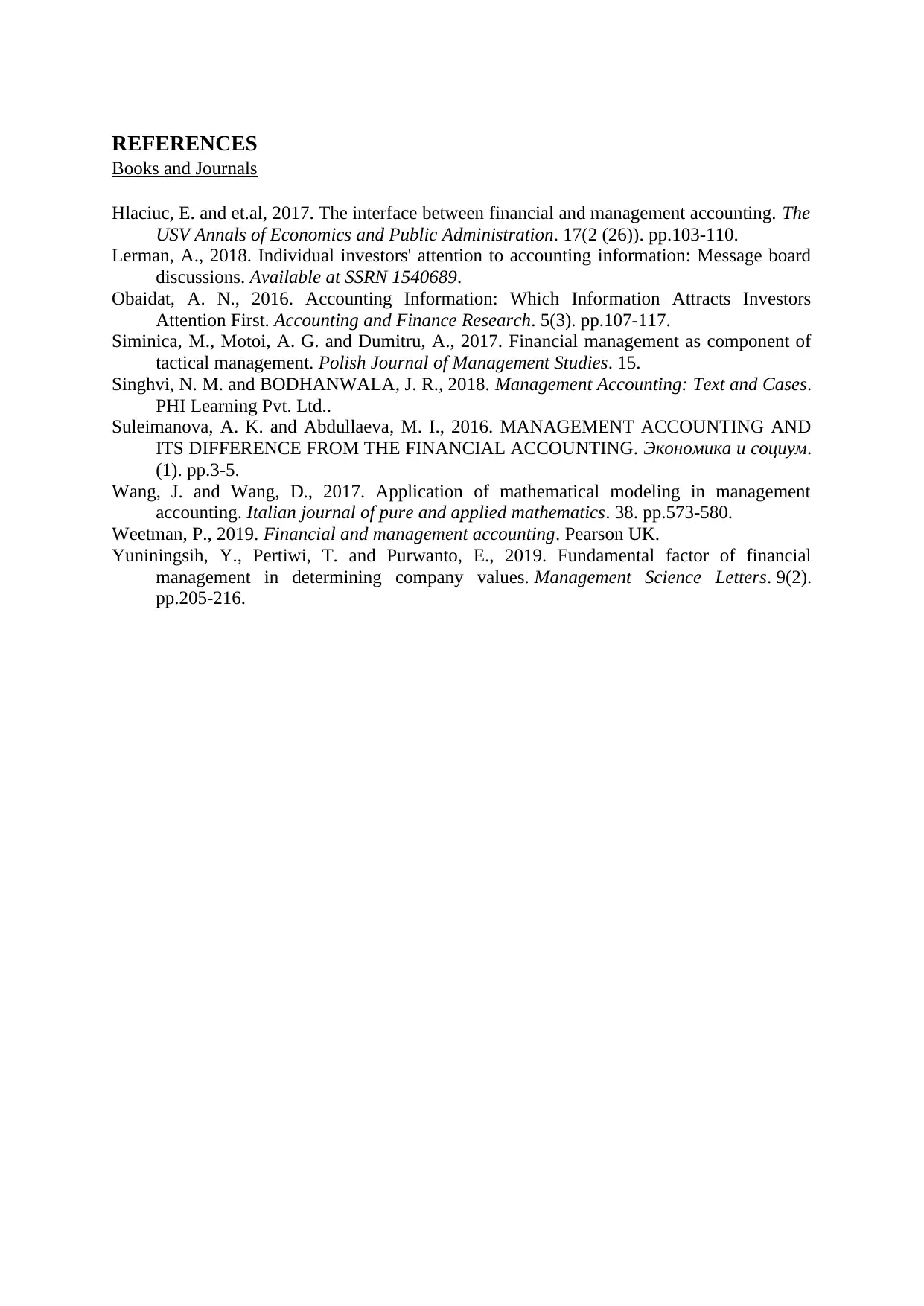
REFERENCES
Books and Journals
Hlaciuc, E. and et.al, 2017. The interface between financial and management accounting. The
USV Annals of Economics and Public Administration. 17(2 (26)). pp.103-110.
Lerman, A., 2018. Individual investors' attention to accounting information: Message board
discussions. Available at SSRN 1540689.
Obaidat, A. N., 2016. Accounting Information: Which Information Attracts Investors
Attention First. Accounting and Finance Research. 5(3). pp.107-117.
Siminica, M., Motoi, A. G. and Dumitru, A., 2017. Financial management as component of
tactical management. Polish Journal of Management Studies. 15.
Singhvi, N. M. and BODHANWALA, J. R., 2018. Management Accounting: Text and Cases.
PHI Learning Pvt. Ltd..
Suleimanova, A. K. and Abdullaeva, M. I., 2016. MANAGEMENT ACCOUNTING AND
ITS DIFFERENCE FROM THE FINANCIAL ACCOUNTING. Экономика и социум.
(1). pp.3-5.
Wang, J. and Wang, D., 2017. Application of mathematical modeling in management
accounting. Italian journal of pure and applied mathematics. 38. pp.573-580.
Weetman, P., 2019. Financial and management accounting. Pearson UK.
Yuniningsih, Y., Pertiwi, T. and Purwanto, E., 2019. Fundamental factor of financial
management in determining company values. Management Science Letters. 9(2).
pp.205-216.
Books and Journals
Hlaciuc, E. and et.al, 2017. The interface between financial and management accounting. The
USV Annals of Economics and Public Administration. 17(2 (26)). pp.103-110.
Lerman, A., 2018. Individual investors' attention to accounting information: Message board
discussions. Available at SSRN 1540689.
Obaidat, A. N., 2016. Accounting Information: Which Information Attracts Investors
Attention First. Accounting and Finance Research. 5(3). pp.107-117.
Siminica, M., Motoi, A. G. and Dumitru, A., 2017. Financial management as component of
tactical management. Polish Journal of Management Studies. 15.
Singhvi, N. M. and BODHANWALA, J. R., 2018. Management Accounting: Text and Cases.
PHI Learning Pvt. Ltd..
Suleimanova, A. K. and Abdullaeva, M. I., 2016. MANAGEMENT ACCOUNTING AND
ITS DIFFERENCE FROM THE FINANCIAL ACCOUNTING. Экономика и социум.
(1). pp.3-5.
Wang, J. and Wang, D., 2017. Application of mathematical modeling in management
accounting. Italian journal of pure and applied mathematics. 38. pp.573-580.
Weetman, P., 2019. Financial and management accounting. Pearson UK.
Yuniningsih, Y., Pertiwi, T. and Purwanto, E., 2019. Fundamental factor of financial
management in determining company values. Management Science Letters. 9(2).
pp.205-216.
Paraphrase This Document
Need a fresh take? Get an instant paraphrase of this document with our AI Paraphraser

1 out of 8
Related Documents
Your All-in-One AI-Powered Toolkit for Academic Success.
+13062052269
info@desklib.com
Available 24*7 on WhatsApp / Email
![[object Object]](/_next/static/media/star-bottom.7253800d.svg)
Unlock your academic potential
Copyright © 2020–2026 A2Z Services. All Rights Reserved. Developed and managed by ZUCOL.





